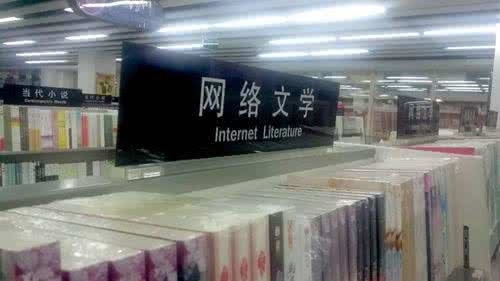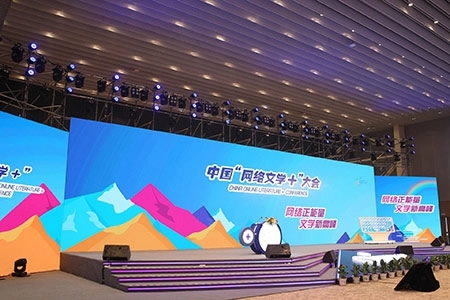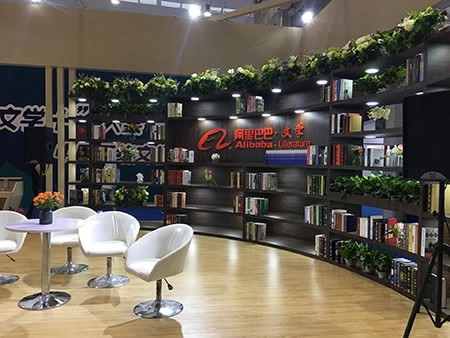
Culture
15:52, 17-Aug-2017
Online Chinese literature fosters billion dollar market
CGTN

The online market for Chinese literature has been growing steadily in recent years, with about 333 million readers making up a market worth nine billion yuan (US$1.35 billion), according to a recent report by Xinhua news agency.
There are at least 40 websites dedicated to more than 14 million works, and an daily average of 150 million characters are updated to serialized books.
The booming industry has also earned fame and wealth for quite a number of online writers. According to a report released at the first "China Online Literature+ Conference" in Beijing, the yearly income for China's top online writer Tangjia Sanshao is estimated to be 122 million yuan (US$18.3 million).

Shelves of online novels published into paperbacks in a bookstore. /Photo via Sina Weibo
Shelves of online novels published into paperbacks in a bookstore. /Photo via Sina Weibo
Wu Wenhui, CEO of China Reading Ltd., said the rapid growth of online literature in China has almost become a "cultural wonder" that is comparable with Japan's comics and South Korea's soap operas.
From a website to an industry
It is hard to imagine that such a massive industry only sprouted some 20 years ago, after William Zhu, a Chinese-American, launched the website "Rongshuxia", providing Chinese writers with the first online publishing platform.
After years of development and especially with the popularization of smartphones and e-books, the industry finally completed its transformation in 2015 with the launch of China Reading Group that integrated several huge literary websites.

Venue of "China Online Literature+ Conference" in Beijing. /Photo via People's Daily
Venue of "China Online Literature+ Conference" in Beijing. /Photo via People's Daily
As of December, 2016, about 43.7 percent of readers access the works through mobile phones.
With an increasing number of online literary works adapted into TV dramas, films and online games, the industry has gradually grown into an industrial chain in recent years.
At the same time, online writers have also been gradually accepted by the mainstream writers, with several young writers selected as members of the China Writers Association.
"Online literature has become a wind indicator of the whole entertainment industry," said Yu Qian, CEO of Alibaba Literature. "It is going through a new round of industrial upgrading, which could climb to a new peak."
The problems tangling a growing industry
However, problems exist in the rapid growing industry, such as plagiarism, which has been haunting the literary scene almost since it came into being.

Poster of film "Once Upon a Time", adapted from a fantasy novel involved in plagiarism dispute. /Photo via Douban.com
Poster of film "Once Upon a Time", adapted from a fantasy novel involved in plagiarism dispute. /Photo via Douban.com
Several hit TV dramas adapted from online novels have been accused of plagiarism in the past two years.
When fantasy movie "Once Upon a Time" was released, accusations of plagiarism resurfaced, as its original source was once accused of ripping off another novel.
Meanwhile, another famous online writer Feiwo Sicun has also accused Liu Lianzi, author of "The Legend of Zhenhuan" of copying one of her novels.
Her critical Weibo posts were reposted over 300,000 times, with most users leaving messages showing their support in the fight against plagiarism.
The hashtag "plagiarism" lingered on top of China's social media platform Sina Weibo for days, and thrust the long debated topic back into the public attention.
Although no official lawsuits were ever filed, insiders in the industry have vowed to crack down on such activities.

Venue for forum at "China Online Literature+ Conference" in Beijing. /Photo via People's Daily
Venue for forum at "China Online Literature+ Conference" in Beijing. /Photo via People's Daily
During the "China Online Literature+ Conference", entrepreneurs from internet-related companies and online writers jointly launched a proposal, calling on business insiders to cope with problems, such as plagiarism and piracy, in order to purify the environment for online literary creation.
These days, online Chinese novels have gained attention from the overseas market. According to non-official statistics, there are nearly 100 websites and online communities devoted to translating Chinese novels into foreign languages for readers scattered in over 20 countries and areas.

Books. /Photo via Twitter
Books. /Photo via Twitter
It is estimated that as of 2020, there will be at least 8.5 million online Chinese writers, and the market is expected to grow by 22.7 percent, reaching 13.4 billion yuan (US$2.01 billion).
But before this can happen and develop, practitioners are still calling for an environment that is more open and healthy.
5km

SITEMAP
Copyright © 2018 CGTN. Beijing ICP prepared NO.16065310-3
Copyright © 2018 CGTN. Beijing ICP prepared NO.16065310-3